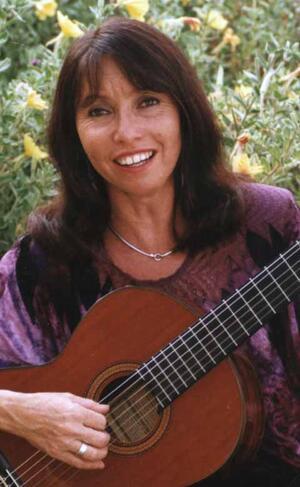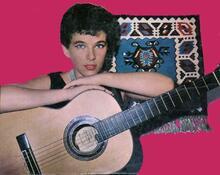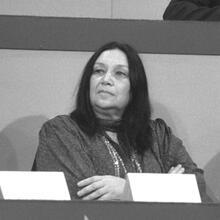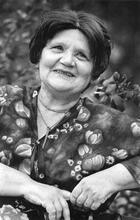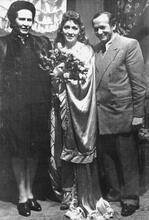Shuly Nathan
Shuly Nathan skyrocketed to fame as an Israeli folk singer at age twenty when she performed Naomi Shemer’s new song “Jerusalem of Gold.” Nathan immigrated with her family from London to Israel when she was two years old. At the age of sixteen, Nathan started singing and playing the guitar. She participated in various radio programs, where Shemer discovered her. Her performance of “Jerusalem of Gold" positioned her as a beloved Israeli folk singer. Nathan toured worldwide and studied music theory at the Rubin Academy of Music and Dance in Jerusalem. In 1968 she met Israeli folk singer Nechama Hendel, and they began a collaborative partnership. After a hiatus to get married and have children, Nathan returned to performing, radio and television appearances, and CD recordings.
Jerusalem of Gold
The beginning of Shuly Nathan’s professional career as an Israeli folk singer is like a fairy tale. At the age of twenty, unknown to the general public, she was asked by composer and poet Naomi Shemer to perform a new song, commissioned by Jerusalem’s mayor, Teddy Kollek, for the annual Israeli Song Festival (National Song Contest, May 1967). The song, entitled “Jerusalem of Gold,” was not included in the formal contest itself but was presented as an “ornamental song.” It immediately captured the audience and put the whole contest in the shade. Shuly was asked to repeat it and everybody in the audience stood up and joined in.
Two weeks later the Six Day War broke out and “Jerusalem of Gold” became the hymn and prayer of the war. It was soon recognized as the greatest hit and most beloved and popular Israeli song ever. Within a short time, 350,000 copies of Shuly Nathan’s recording of “Jerusalem of Gold” were sold and it was regarded as the best-selling record in the history of Israel. This was the beginning of a new chapter in Nathan’s life and her successful and ongoing career as a singer.
In June 1967 Shuly Nathan was still serving in the Israeli army (as an educator for newly arrived immigrant women who settled on a Cooperative smallholder's village in Erez Israel combining some of the features of both cooperative and private farming.Moshav, a smallholders’ cooperative settlement in southern Israel). As a soldier she was invited many times to sing the new song for the military troops in the region. Undoubtedly, the tremendous success of “Jerusalem of Gold” was largely due to her fine singing and sensitive interpretation.
Early Life
Shuly Nathan was born in London on March 16, 1947. Her father, Yehoshua (Joshua) Bauernfreund (1915–1990), born in the village of Zboroz-Bardiov near Bratislava in Slovakia, came to England as a refugee in 1939. There he met Chava (Eva) Nathan (1915–1970), a refugee from Hamburg, Germany, where she was born into an old Jewish family of Portuguese origin. Her father, Abraham Nathan, was a leading tenor at the Hamburg City Opera during the early years of the twentieth century. Nathan’s parents married in 1945, immediately after the war, and immigrated to Israel in 1949, when Shuly (Shulamith) was two years old. Both parents were artists. Yehoshua was a painter and sculptor and Chava was an illustrator and potter. They settled in the village of Bnei Atarot in the center of Israel. When Shuly was seven years old the family moved to Ramat Gan, where she completed elementary and secondary school. Her brother Ilan was born in 1956.
Performance Career and Family
At the age of sixteen Nathan started singing, playing the guitar and collecting folk songs. At this time she participated in various amateur radio programs in one of which Naomi Shemer heard her for the first time. Following her success with the first performance of “Jerusalem of Gold” Shuly dedicated herself to a singing career and was established as one of the most beloved folk singers in Israel. Besides giving concerts she also studied music theory and solfège at the Rubin Academy of Music and Dance in Jerusalem. She has performed in many countries, including the Netherlands, Norway, Finland, the United States, the United Kingdom, Canada, Australia, South America and Japan.
In 1968 Nathan met the already well-known Israeli folk singer Nechama Hendel, with whom she started to share concerts and to collaborate in various productions. In 1970 Nathan joined the International Spiritual Brotherhood of Subud, the main aim of which is to contribute to making the world a better, safer and more humane and harmonious place to live in through the worship of Almighty God. In 1975 Shuly married Matthew Weiss (b. 1943), an American Jew and expert computer programmer, whom she met during a visit to England. Their traditional wedding was held in Israel and within a year they settled in Ra’anannah, north of Tel Aviv. In the years that followed they had five children, four sons and a daughter: Kenneth (b. 1976), Orion (b. 1978), Mira (b. 1980), Sean (b. 1982) and Harel (b. 1983).
All the children received their education at the Tali school in Hod ha-Sharon, which emphasizes the values and tradition of Judaism. The years in which she dedicated herself to raising her children entailed a long break in Nathan’s career, but when Harel started day care at the age of two she was able to return to singing and playing the guitar.
The news of her comeback as a singer was enthusiastically and warmly welcomed by the Israeli media, which gave her wide coverage, thus bringing her back to the public’s awareness. A new chapter in Shuly’s career began with radio and television appearances and CD recordings, proving that her popularity had not faded away despite the long interruption.
The resumption of her career was accompanied by a crisis in her marriage which resulted in the couple’s separation. Matthew moved to Ireland, while Shuly continued with her intensive and successful singing career and also renewed the collaboration with Nechama Hendel (who in the meantime had moved back to Israel from Australia), even though their singing style and characteristics of voice were different.
Nathan’s clear and melodious voice represents some of the best qualities of true folk singing. Her varied repertoire consists not just of songs which happen to be fashionable at the moment but of carefully selected outstanding songs, both old and new. Some songs that became popular thanks to her were: “Mi Ha-Ish” (Who is the man who is eager for life; Psalms 34:13), music by Baruch Chait; “Ana Eli” (Please, God), music by Nathan; “Rekhev Esh” (Chariot of Fire); “Zemer” (Melody); “Be-Gani Neta’atikhah” (Sapling in My Garden), lyrics by Rahel, music by Naomi Shemer; and “Matai ha-Yom” (When comes the day, a traditional Moroccan song of yearning for Jerusalem).
Selected Works by Shuly Nathan
Beloved Songs. Israeli songs in Hebrew. Hed Arzi: 1995.
Songs of Praise (Jewish folk songs and prayers in Hebrew. (“Mi Ha-Ish,” “Lekhah, Dodi” and “Al Ahat Kamah ve-Kamah” sung with Nechama Hendel; medley on final track sung with women of the Makuya movement.) Hed Arzi: 1995.
Open Roads. New Hebrew songs and Jewish traditional chants. (Title track sung with Nechama Hendel and The Taverners.
Hebrew version of “Hard Times, Come Again No More,” by Stephen Foster (translated by Ehud Manor), sung with The Taverners.
“Blessed Be the Almighty,” “Most Beautiful Bird” and “Lovingly Inherit Your Land” sung with Rahel Jaskow.) Hed Arzi: 1999.
Mostly Carlebach. (“Mizmor le-David,” Elohai, Neshamah” and two medleys of songs by Rabbi Shlomo Carlebach sung with Rahel Jaskow.) Hed Arzi: 2003.

